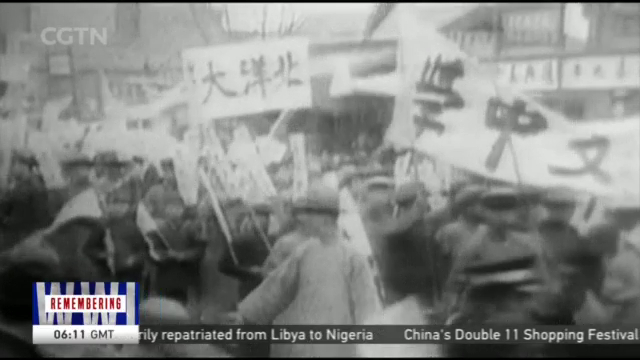
14:48, 11-Nov-2018
The End of WWI: 100 Years On: Postwar diplomatic failure pushed China to search for new path
Updated
13:41, 14-Nov-2018
02:50

China did not send troops to the battlefield, but its involvement in the war was influential and has shaped the country's future development. Tang Bo has the story.
China declared itself neutral at the start of World War One. But it began shipping out thousands of non-combatant volunteer workers to embattled Allied countries in 1916, and declared war on Germany in 1917. Experts say the purpose was to reshape the geopolitical balance of power.
WANG DINGJIE, STRATEGY SCHOLAR WANG DINGJIE CULTURAL COMMUNICATION "Japan also declared war on Germany and was trying to become involved in the war. If China didn't join the allied countries, there would be no chance of being on the victorious side and winning back territories taken by Japan in east China's Shandong Province."
When the war ended in 1918, China planned its delegation for the Paris Peace Conference, hoping to finally achieve full control of its occupied territories.
But Western powers ultimately awarded Shandong to Japan simply because the western diplomats believed they should honor the treaty Japan pressured China to sign that gave away the territory.
WANG DINGJIE, STRATEGY SCHOLAR WANG DINGJIE CULTURAL COMMUNICATION "Many Chinese then realized that China was not treated as an equal player in global politics by the western major powers and was a victim of European political hegemony. As a result, China stopped looking up to the West and started to find other development paths."
A student-led protest in Beijing called the May Fourth Movement was organized in response to the results of the Paris Peace Conference.
It called for political and social changes and, was a sign of China's turn towards socialism in 1921 with the foundation of the Communist Party of China.
TANG BO BEIJING "What's behind me is the New Culture Movement Memorial Hall of Beijing, previously part of Peking University, and also known as the Red Building. Since its establishment in 1918, it has become the origin of the Chinese advanced minds and cultures. After the May Fourth Movement, a large number of people with lofty ideals learned about Marxism here."
By following this path, China ended the suffering of being poor and weak, and has now become the world's second largest economy. Experts say what happened a hundred years ago is still enlightening for China and the world.
WANG DINGJIE, STRATEGY SCHOLARS WANG DINGJIE CULTURAL COMMUNICATION "The most fundamental principle of co-existence for major powers is to maintain conflicts without complete breaks. Otherwise, it would be a lose-lose game. Today, the world's economic driving forces have transferred to the Asia-Pacific region. There will be long-term mutual benefit and common progress as long as the regional powers work together to maintain basic peace and stability."

SITEMAP
Copyright © 2018 CGTN. Beijing ICP prepared NO.16065310-3
Copyright © 2018 CGTN. Beijing ICP prepared NO.16065310-3